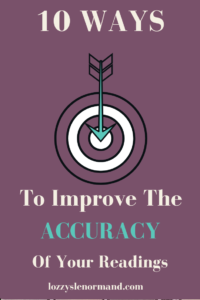 So when you’re reading for yourself, how accurate can your readings be? Are you unsure whether you CAN be accurate if you’re reading for yourself or should you always get someone else to perform readings for you?
So when you’re reading for yourself, how accurate can your readings be? Are you unsure whether you CAN be accurate if you’re reading for yourself or should you always get someone else to perform readings for you?
In my view, it is perfectly possible to do good, clear and useful readings for yourself. However, there are certain common issues that can prevent your readings being as accurate as they may be. Check out my following ten tips for improvement below:
1. Take The Emotion Out Of It
I made this number one for a reason, and it’s why people sometimes prefer to get someone else to read for them. It’s very, very hard to keep your wishes out of things when really, you desperately want the outcome to go a certain way. It’s hard to read or see clearly when your mind is full of panic. And of course, we do often turn to things like cartomancy for things that are emotional in nature or we’re facing something that feels like a calamity.
“Is this my soulmate?” you ask, heart all aflutter, when, of course, all you want to see is an answer confirming “Yes!” Or “Will I ever realise this dream?” you say, at a low point when it seems particularly impossible. Of course you do. Human nature. Or “Oh my god! This is a nightmare! My whole world is collapsing! What on earth should I do?”
Here’s the thing. What use is it to you if you interpret the cards as ‘yes’ when a few months later you notice there was a big red flag in there all along saying, essentially “Hello? He’s a massive creep!” and you ignored that? Did it actually help you in reality? If you’re desperate for money and you ignore anything that doesn’t mean “Yes, a million dollars is gonna drop from the sky tomorrow!” how helpful is that, actually? “Yes, it IS a nightmare,” when you ignore all the cards that say “Hang on, there might be something positive you can get out of this!” doesn’t help you one bit. I know it’s hard. But for accuracy, you need to get a healthy distance between you and the problem.
2. Clear Your Head
Following on from the above, a calm, clear mind rather than being mid-frenzy, over-excited or in a panic is best when you are reading the cards.
Got it? Get your head calm. And clear. Do not, I repeat, Do not read when you are feeling over-emotional.
First off, take a BIG deep breath before you start. Remove distractions: don’t read when you’ve got one eye on the TV, are busy scanning your Twitter, or when you’ve got your kids running around you. There may be particular ways and places you have of reading the cards. Rituals, without which you don’t feel quite right. A cloth you use, a candle, a particular deck, a space. It’s different for everyone, but these are the kinds of things you can use to ground you. So use them. Also any way you have of ‘knowing’ when something feels right. Use your normal methods.
3. Be Objective. See What Is There, Not What You WANT To Be There
That old chestnut. “Yeah, yeah, yeah, I know,” you think, “Of course!” I know you’ll have seen me and others saying this a million times. But it’s another thing that’s easy to say and very difficult to do in practice.
It’s human nature to be subjective. We all want to see certain outcomes, or at least, hope for them. The fact that we do often choose to do a reading when something is really important to us or we are worried or desperate or whatever makes this even harder. Problem is, this can skew how we interpret things. You HAVE to make a conscious effort to step back and try and see the situation objectively. You have to be prepared to see what is there, even or especially if you don’t want it to be there or don’t want to see it. You need to give every card equal weight. You can’t ignore inconvenient ones or ones that don’t fit your narrative or what it is you want to see, especially when you’re feeling very invested emotionally one way or another.
4. Open Your Mind To Different Possible Answers
Keeping an open mind – a truly open mind as to what answer or what sort of answer you might get – is also extremely difficult, but is important for accuracy. Sometimes this is because you are locked into, not only a particular answer, but a particular framework for an answer. “Which is better, A or B?” Well, sure, the answer could be A, it could be B… or it could be “Neither.”
You need to be open to your answers not necessarily being anything like you expected. Again this isn’t always easy to achieve.
5. Be Systematic And Step-By-Step In Your Readings
A very good way of forcing yourself to be objective and distancing yourself is to make sure you do your readings carefully, systematically, and step-by-step. This means no card should be given extra weight, and every single card needs to be examined for its meaning.
This is why on this site and in my practice workbooks I encourage Lenormand learners to take a step-by-step approach to all their readings. Check out my Card Layout pages or Sample 5-Card Interpretation Reading for an example of this in action.
6. Don’t Ignore “Problem” Unwanted, or Hard To Understand Cards
“Oh, pfft. There’s the Fox in a context that has nothing to do with work. Well, who cares. The guy still loves me, right?”
or
“What the HECK is that doing there and what does that mean?”
or
“Yeah, I’ve never really understood that card. So… I’ll just look at the rest & ignore it.”
The problem with this is that just one card can alter the tone and therefore the meaning of the whole reading!. Lenormand is a storytelling system using card combinations. Every card in a reading really does count.
Rather than ignore it, take a look at my post about positive ways of dealing with difficult cards here:
Negative Lenormand Cards & Positive Ways To Deal With Them
7. Try To Be Totally Honest With Yourself
This goes along with all the rest of the points around making yourself be as objective as possible and opening your mind to possibilities. But also asking yourself questions about why you’re doing the reading in the first place. What is at the root of it and what do you want to hear? Why? What are you hoping for? What does that tell you about things in your life at the moment? What are the cards telling you about what you need rather than what you necessarily want?
How To Get To The Root Of A Lenormand Reading
8. Learn The Card Meanings & Know How To Apply Them In Context
The key to this is to understand the underlying card meanings thoroughly and then applying them in different contexts. As a Lenormand reader, learning the card meanings and getting confident with them and their nuances is the basis of the whole system. Without being able to do this, you’ll struggle to do readings with any accuracy.
How Do I Know Which Lenormand Card Meaning Is Right?
Why Context Is Important In Lenormand Readings
9. STOP Relying on Lists!
Lists are useful as a back-up or a reference, but if you want to learn to become a truly accurate Lenormand reader, you need to wean yourself off using them and clinging to them every time you do a reading. No list or book can tell you every single possible meaning in every single context or combination because there are literally thousands of possibilities!
So Once you are clear and confident about the meanings of all the cards and have practiced them in different layouts, it’s time to start coming up with interpretations more independently and when your intuition starts to be involved. How about instead of rushing to look up in your card combination lists every time, you try to come up with your card combinations yourself in a reading, and THEN look back at the list to check once you have?
How To Read Lenormand Card Combinations – The No. 1 Secret
How To Make Your Own Lenormand Card Combinations
10. Write Your Own Readings Down And Check Back On Them Periodically
Practice makes perfect, and if you are doing readings over time, it makes sense to have them all written down somewhere – maybe like a journal – and look back on them over time, especially after a few months and weeks have passed. What came to pass, what hasn’t? What came to pass in a different way than you anticipated or wanted? How have the cards worked for you? Are there some cards that worked a certain way for you and not in others? What about the layouts you used? Which do you prefer and why? Do you tend to do predictive readings? If so, how accurate were they and why or why not might that be?
Or did you use them more as a personal development tool? What were the results? What influences were accurate in your life?
Your Lenormand Journal: 5 Exercises To Try
5 Personal Development Exercises For Your Lenormand Journal
Want A Private Reading?
I can help you interpret your own readings: your own layouts and your own cards. Please see my service page here for how to order. (Oh, and be sure to check my code of ethics as to my approach!). You can check out samples of my reports here:
SAMPLE ONE QUESTION 9-CARD READING
Or Do You Need More Guidance?
Go to my Lenormand Tips page for more tips about common issues and problems.
For a FREE card combinations PDF E-Book, sign up to my mailing list for weekly newsletters and other freebies. If you don’t want to sign up, it’s also available in paperback and ebook format from Amazon.
Also, my Complete Guide to Lenormand e-book as well as my Love and Careers workbooks are now available from Amazon, Kobo, Barnes & Noble, Apple Books & other ebook platforms.
